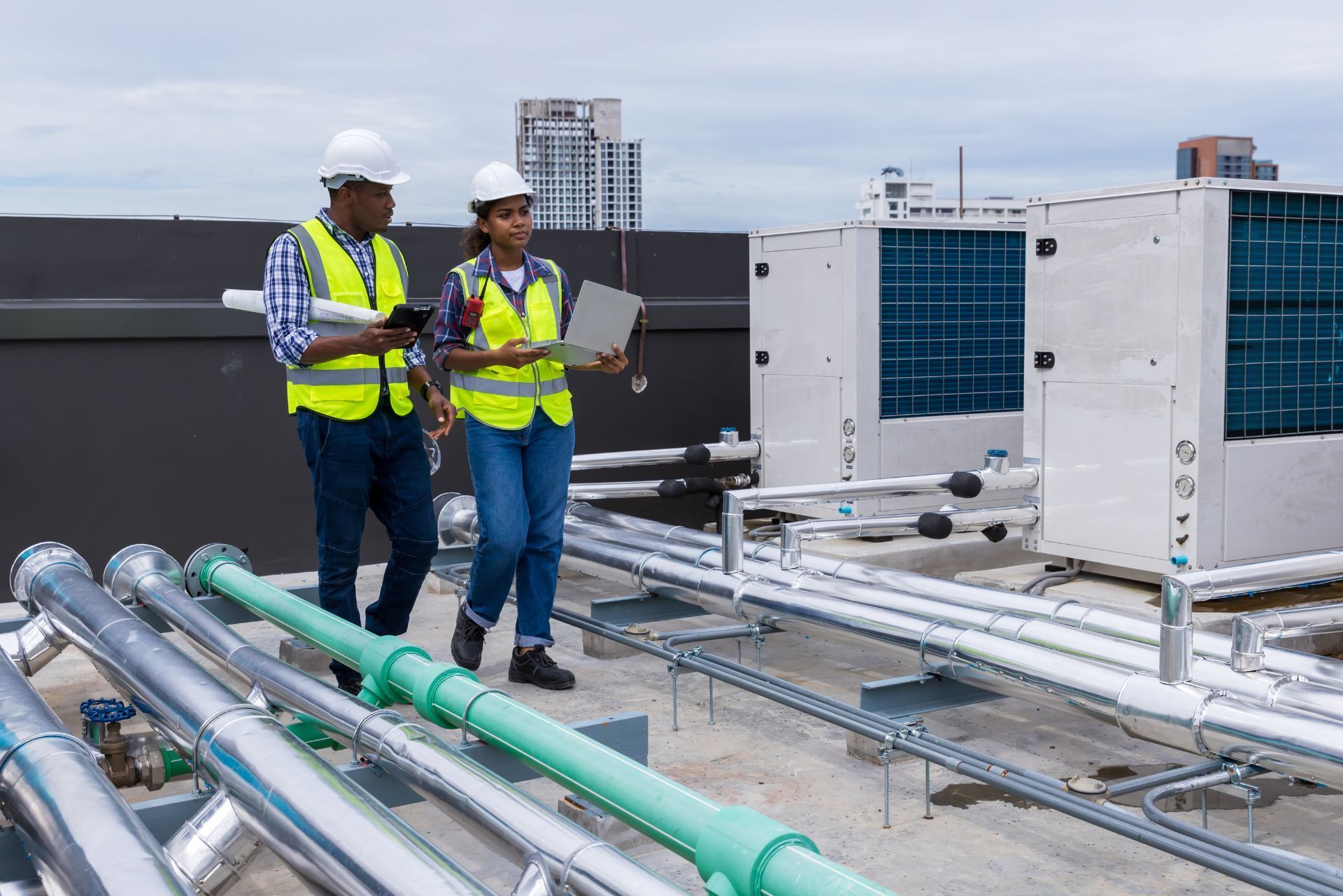Top 3 Recommended Policies

Heating, ventilation, and air conditioning (HVAC) systems play a crucial role in maintaining comfort in residential and commercial spaces. However, like any other mechanical system, they are prone to wear and tear, breakdowns, and various risks. This is where HVAC insurance comes into play. Understanding the ins and outs of HVAC insurance can save business owners and homeowners significant amounts of money and stress. This article delves into everything you need to know about HVAC insurance, from its importance to coverage options and tips for choosing the right policy.
Understanding HVAC Insurance
HVAC insurance is a specialized type of coverage designed to protect HVAC contractors, businesses, and homeowners against potential risks associated with heating and cooling systems. This insurance can cover various aspects, including equipment breakdown, liability, and property damage. Given the complexity and cost of HVAC systems, having the right insurance is essential for safeguarding investments and ensuring peace of mind.
Why HVAC Insurance Is Important
Investing in HVAC insurance is crucial for several reasons. First and foremost, it protects against unexpected repair costs that can arise from equipment failure or accidents. HVAC systems are often expensive to repair or replace, and without insurance, these costs can quickly add up.
Moreover, HVAC contractors face unique risks, such as property damage or bodily injury that may occur during installation or maintenance. HVAC insurance provides liability coverage to protect against lawsuits and claims, ensuring that businesses can operate without the constant worry of financial ruin due to unforeseen events. Additionally, the nature of HVAC work often involves working in various environments, from residential homes to commercial buildings, each with its own set of challenges and potential hazards. This variability increases the importance of having comprehensive insurance coverage tailored to the specific risks associated with different job sites.
Types of HVAC Insurance Coverage
There are several types of HVAC insurance coverage available, each catering to different needs. Understanding these options can help individuals and businesses choose the right policy.
- General Liability Insurance: This coverage protects against third-party claims for bodily injury or property damage resulting from HVAC work.
- Equipment Breakdown Insurance: This policy covers the repair or replacement of HVAC equipment that fails due to mechanical breakdown, electrical failure, or other covered events.
- Professional Liability Insurance: Also known as errors and omissions insurance, this coverage protects HVAC contractors against claims of negligence or inadequate work.
- Workers' Compensation Insurance: Essential for businesses with employees, this insurance covers medical expenses and lost wages for workers injured on the job.
In addition to these standard types of coverage, HVAC businesses may also consider specialized endorsements or additional policies that address specific risks. For instance, some contractors may opt for coverage that includes
environmental liability, which addresses potential pollution or contamination issues that could arise from refrigerant leaks or improper disposal of hazardous materials. Furthermore, as technology advances, the integration of smart HVAC systems introduces new complexities and risks, making it vital for contractors to stay informed about emerging insurance products that can provide adequate protection in this evolving landscape.

Key Considerations When Choosing HVAC Insurance
Choosing the right HVAC insurance policy requires careful consideration of several factors. Each business or homeowner's needs may vary, so it's essential to assess specific requirements before making a decision.
Assessing Coverage Needs
Before selecting an insurance policy, it's vital to evaluate the specific coverage needs. For HVAC contractors, this may include general liability, equipment breakdown, and professional liability coverage. Homeowners should consider coverage that protects their HVAC systems against breakdowns and damages.
Conducting a thorough risk assessment can help identify potential vulnerabilities and determine the necessary coverage levels. Consulting with an insurance professional can also provide valuable insights into appropriate coverage options. Additionally, it may be beneficial to consider endorsements or riders that can enhance the policy, such as coverage for natural disasters or vandalism, which can be particularly relevant in certain geographic areas. Understanding the nuances of these additional options can ensure that both contractors and homeowners are fully protected against unforeseen events.
Understanding Policy Limits and Deductibles
Every insurance policy comes with limits and deductibles, which can significantly impact the overall cost and effectiveness of the coverage. Policy limits refer to the maximum amount an insurer will pay for a covered claim, while deductibles are the amounts policyholders must pay out-of-pocket before the insurance kicks in.
It's essential to choose policy limits that adequately cover the potential costs associated with HVAC repairs or liability claims. Additionally, selecting a deductible that aligns with the budget can help manage expenses effectively. It’s also wise to review the terms of the policy regularly, as changes in business operations or property usage may necessitate adjustments to coverage limits or deductible amounts. Staying proactive in this regard can prevent gaps in coverage that could lead to significant financial repercussions in the event of a claim.
Comparing Quotes from Different Insurers
Obtaining quotes from multiple insurance providers is a crucial step in finding the best HVAC insurance policy. Each insurer may offer different coverage options, limits, and premiums, making it essential to compare these factors carefully.
When comparing quotes, consider not only the cost but also the reputation and customer service of the insurance company. Reading reviews and seeking recommendations can provide insights into the insurer's reliability and claims process. Furthermore, it may be advantageous to inquire about any discounts that could apply, such as bundling policies or having a claims-free history, which can lead to significant savings. Engaging with an insurance broker who specializes in HVAC coverage can also streamline this process, as they can provide tailored advice and help navigate the complexities of different policies to find the best fit for your specific needs.
Common Exclusions in HVAC Insurance Policies
While HVAC insurance provides valuable protection, it's essential to be aware of common exclusions that may limit coverage. Understanding these exclusions can help avoid surprises when filing a claim.
Pre-existing Conditions
Most insurance policies do not cover pre-existing conditions, meaning that any damage or malfunction that existed before the policy was purchased will not be covered. It's crucial to have a thorough inspection of the HVAC system before obtaining insurance to ensure that any existing issues are addressed. This preemptive step not only helps in identifying potential problems but also provides peace of mind, knowing that your system is in optimal condition before you commit to an insurance policy.
Additionally, many HVAC professionals recommend routine maintenance checks, which can often uncover hidden issues that might otherwise go unnoticed. By investing in regular inspections and repairs, homeowners can not only prolong the lifespan of their HVAC systems but also potentially save on future insurance costs by demonstrating a commitment to proper care.
Negligence and Poor Maintenance
Insurance policies typically exclude coverage for damages resulting from negligence or lack of proper maintenance. Regular maintenance and servicing of HVAC systems are essential to prevent breakdowns and ensure that the system operates efficiently. This includes tasks such as changing filters, cleaning ducts, and scheduling professional tune-ups at least once a year.
Documenting maintenance records can help demonstrate that the system has been adequately cared for, which may be beneficial when filing a claim. Furthermore, many manufacturers require proof of regular maintenance to honor warranties, making it doubly important to keep detailed logs of all service work performed. By maintaining a proactive approach to HVAC care, homeowners can mitigate risks and enhance the longevity of their systems.
Acts of God
Many HVAC insurance policies exclude coverage for damages caused by natural disasters, such as floods, earthquakes, or hurricanes. Homeowners and businesses in areas prone to such events may need to consider additional coverage or separate policies to protect against these risks. In some cases, standard homeowners insurance may offer limited protection for HVAC systems affected by these disasters, but it often comes with high deductibles or specific limitations.
Moreover, understanding the specific risks associated with your geographic location can guide you in selecting the right coverage. For instance, if you live in a flood-prone area, it may be wise to invest in flood insurance, which could cover damage to your HVAC system caused by water intrusion. Consulting with an insurance agent who specializes in HVAC coverage can provide tailored advice to ensure that you have the necessary protections in place for your unique situation.
Benefits of HVAC Insurance
Investing in HVAC insurance offers numerous benefits that can significantly enhance peace of mind and financial security. Understanding these advantages can help individuals and businesses appreciate the value of having proper coverage.
Financial Protection
One of the most significant benefits of HVAC insurance is financial protection against unexpected repair costs. Whether it's a sudden equipment breakdown or liability claims arising from accidents, having insurance ensures that individuals and businesses are not left to bear the financial burden alone.
This protection can be particularly crucial for HVAC contractors, who may face substantial expenses if equipment fails during a job or if a client files a claim for damages. Additionally, the costs associated with replacing or repairing HVAC systems can be exorbitant, often running into thousands of dollars. With HVAC insurance, contractors can mitigate these risks, allowing them to allocate resources more effectively and invest in growth opportunities rather than being sidelined by unforeseen expenses.
Improved Business Reputation
For HVAC contractors, having insurance can enhance credibility and professionalism in the eyes of clients. Many customers prefer to work with insured contractors, as it demonstrates a commitment to quality and responsibility. This can lead to increased business opportunities and a stronger reputation in the industry.
Moreover, an insured contractor is often seen as a more reliable choice, as clients feel reassured that they are protected should anything go wrong during the service. This trust can translate into repeat business and referrals, which are vital for the growth of any HVAC company. By showcasing their insurance coverage in marketing materials and during client consultations, contractors can set themselves apart from competitors, further solidifying their standing in a crowded marketplace.
Peace of Mind
Knowing that HVAC systems are protected against potential risks provides peace of mind for homeowners and business owners alike. This sense of security allows individuals to focus on other aspects of their lives or businesses without the constant worry of unexpected costs or liability claims.
Furthermore, this peace of mind extends beyond just financial aspects; it also encompasses the assurance that qualified professionals are handling their HVAC needs. Homeowners can rest easy knowing that their systems are being serviced by insured technicians who are trained to manage risks effectively. This not only fosters a sense of safety but also encourages proactive maintenance, which can lead to longer-lasting HVAC systems and improved energy efficiency. In this way, HVAC insurance not only protects against the unexpected but also promotes a culture of responsibility and care in the maintenance of essential systems.


How to File a Claim on Your HVAC Insurance
Filing a claim on HVAC insurance can be a straightforward process if individuals and businesses understand the necessary steps. Knowing how to navigate the claims process can help ensure that claims are handled efficiently and effectively.
Documenting the Incident
The first step in filing a claim is to document the incident thoroughly. This includes taking photographs of any damage, gathering witness statements, and collecting relevant receipts or invoices. The more evidence collected, the stronger the claim will be.
It's also essential to keep records of any communications with the insurance company, as this can help streamline the claims process and provide a clear timeline of events.
Contacting the Insurance Provider
Once the incident has been documented, the next step is to contact the insurance provider to report the claim. Most insurance companies have a dedicated claims department, and it's essential to provide them with all the necessary information and documentation.
During this process, it's crucial to be honest and transparent about the incident, as any discrepancies may lead to delays or denial of the claim.
Follow Up on the Claim
After filing the claim, it's important to follow up regularly with the insurance provider to check on the status. Claims processing times can vary, and staying informed can help ensure that the claim is handled promptly.
If any additional information is required, be prepared to provide it quickly to avoid further delays in processing the claim.
Tips for Maintaining Your HVAC System
While HVAC insurance provides valuable protection, regular maintenance of the HVAC system is essential to prevent breakdowns and ensure optimal performance. Implementing a proactive maintenance plan can extend the lifespan of the system and reduce the likelihood of costly repairs.
Schedule Regular Inspections
Scheduling regular inspections with a qualified HVAC technician is crucial for identifying potential issues before they escalate. During these inspections, technicians can check for signs of wear and tear, clean components, and ensure that the system operates efficiently.
Many HVAC companies offer maintenance plans that include regular inspections, which can help streamline the process and ensure that the system receives the necessary care.
Change Filters Regularly
One of the simplest yet most effective maintenance tasks is changing the air filters regularly. Clogged filters can restrict airflow, leading to reduced efficiency and increased strain on the system. Depending on usage, filters should be changed every one to three months to maintain optimal performance.
Homeowners can easily perform this task themselves, making it a cost-effective way to enhance the longevity of the HVAC system.
Keep the Area Around the Unit Clear
Maintaining a clear area around the outdoor unit is essential for proper airflow and efficiency. Overgrown vegetation, debris, or obstructions can hinder the system's performance and lead to potential damage.
Regularly inspecting the outdoor unit and ensuring that it is free from obstructions can help prevent unnecessary strain on the system and reduce the likelihood of breakdowns.
Conclusion
HVAC insurance is a vital consideration for both homeowners and HVAC contractors. Understanding the various types of coverage, assessing specific needs, and being aware of common exclusions can help individuals make informed decisions when selecting a policy. Additionally, regular maintenance of HVAC systems can enhance performance and reduce the likelihood of costly repairs.
Investing in the right HVAC insurance not only provides financial protection but also contributes to peace of mind and improved business reputation for contractors. By following the tips outlined in this article, individuals can ensure that their HVAC systems remain in optimal condition and that they are well-prepared for any potential risks.
In the ever-evolving world of HVAC technology and services, staying informed about insurance options and maintenance practices is essential for long-term success and satisfaction.
Contact Us


